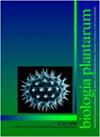Transcriptomic and proteomic profile approaches toward drought and salinity stresses
IF 0.9
4区 生物学
Q4 PLANT SCIENCES
引用次数: 0
Abstract
Drought and salinity, which can alter the water balance, disrupt the ionic equilibrium, and create reactive oxygen species (ROS), are capable of destroying plant tissues. In this study, transcriptomics, proteomics, and metabolomics have been used to elucidate various abiotic stress responses. In transcriptional signaling pathways, abscisic acid (ABA) is one of the plant phytohormones that regulate the stress response. On the other hand, several regulons and factors of transcription contributed in the reaction to osmotic stresses, as well as in ABA-dependent/independent signaling pathways. However, the findings display that intricate molecular reaction of plants under stress conditions may be controlled by complicated regulative networks of gene expression and signal transduction, as well as by the interaction between them. From the point of view of proteomics, protein modifications in response to stress can be considered as a molecular tool to improve the resistance of plants to environmental stresses. These studies have provided new information about the significance of several gene and protein networks involved in the response of plants to salinity and drought, and the induction of tolerance. Moreover, identifying the crucial pathways which are involved in salinity and drought resistance can open doors for the establishment of commercial-resistant crop cultivars, and might be very useful in the next-generation crop breeding strategies to produce plants with salinity and drought-resistant traits.干旱和盐度胁迫的转录组学和蛋白质组学研究
干旱和盐度会改变水分平衡,破坏离子平衡,产生活性氧(ROS),从而破坏植物组织。在这项研究中,转录组学、蛋白质组学和代谢组学已被用于阐明各种非生物应激反应。在转录信号通路中,脱落酸(ABA)是调控胁迫反应的植物激素之一。另一方面,一些调控因子和转录因子参与了对渗透胁迫的反应,以及aba依赖/独立的信号通路。然而,这些研究结果表明,植物在逆境条件下复杂的分子反应可能受到复杂的基因表达和信号转导调控网络的控制,以及它们之间的相互作用。从蛋白质组学的角度来看,蛋白质对胁迫的修饰可以被认为是提高植物对环境胁迫抗性的分子工具。这些研究提供了一些基因和蛋白质网络在植物对盐和干旱的反应以及诱导耐受性中的重要意义的新信息。此外,确定盐和干旱抗性的关键途径可以为建立商业抗性作物品种打开大门,并可能对培育具有盐和干旱抗性性状的下一代作物育种策略非常有用。
本文章由计算机程序翻译,如有差异,请以英文原文为准。
求助全文
约1分钟内获得全文
求助全文
来源期刊

Biologia Plantarum
生物-植物科学
CiteScore
2.80
自引率
0.00%
发文量
28
审稿时长
3.3 months
期刊介绍:
BIOLOGIA PLANTARUM is an international journal for experimental botany. It publishes original scientific papers and brief communications, reviews on specialized topics, and book reviews in plant physiology, plant biochemistry and biophysics, physiological anatomy, ecophysiology, genetics, molecular biology, cell biology, evolution, and pathophysiology. All papers should contribute substantially to the current level of plant science and combine originality with a potential general interest. The journal focuses on model and crop plants, as well as on under-investigated species.
 求助内容:
求助内容: 应助结果提醒方式:
应助结果提醒方式:


